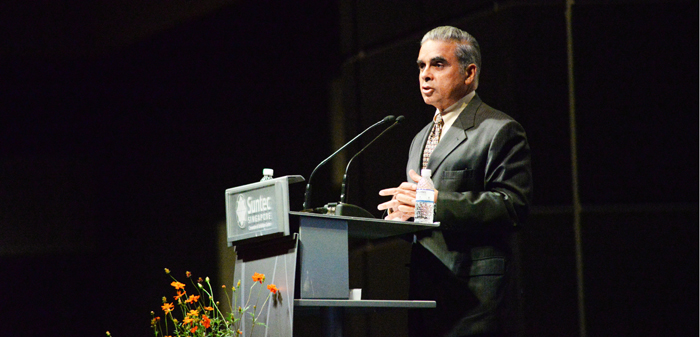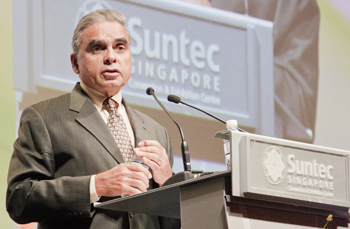Young Children’s Voices in Mathematical Problem Solving
Contributed by Dr Ho Siew Yin and Sng Wei Qin Abbie, from NTUC First Campus, for SingTeach Virtual […]
Read More
Professor Kishore Mahbubani’s childhood was not easy, but three things transformed his life: his love for reading, his teachers and his desire to question everything. This article is based on his keynote address at the Teachers’ Conference 2014.

I want to begin by emphasizing that I agree with Minister of Education Heng Swee Keat’s remark that teaching Character and Citizenship Education is very difficult. It’s a fact that most of the values we absorb in our lives and the values that we live by come from our parents and from our homes.
Schools can make a difference, but the primary source of teaching in moral education will have to be the home. The question is: What else can the schools do to complement what is being done in the home?
Since I’m not a professional educationist, what I’ll try to do is to reflect on my childhood. Clearly by most standards, I’ve come a long way. I came from a life of hardship and ended up with a life of relative success. So, what happened?
My experience has taught me that teachers make a huge difference in life.
– Professor Kishore Mahbubani, Dean, Lee Kuan Yew School of Public Policy, National University of Singapore
Purely by accident, I discovered the Joo Chiat Public Library. I must have been 7 or 8 then. I would go there every week and borrow four to five books, and I was known as the bookworm.
Looking back now, if that hadn’t happened, there was no way I could have been the writer I am today. It was all those years of reading. Most of the time, I write correctly because of all the reading that I did. I emphasize this because I fear that the habit of reading is becoming less common in Singapore and globally.
I believe that if you want to teach moral education, there’s no better way than to get children to read novels. Literature is the best guide to obtaining a good moral sensibility. So, if children do not read novels, they have a major disadvantage in life. I don’t know what we can do to promote it, but that’s one thing I can encourage you all to do because that’s how you build character and resilience in children.
We are luckier today because we didn’t have Harry Potter then! Having only read one book in the series, I can already see how the story of Gryffindor versus Slytherin in the game of Quidditch – how one team plays by the rules and the other doesn’t – exposes all the moral dilemmas we have to deal with. And it’s much more accessible for today’s generation than the books we had in my generation. So, please encourage more reading among your students.

The second way my life was transformed, from the age of 6 to 16, was due to my teachers. I went to Tanjong Katong Technical School. In Secondary 3, I had to sit for the Metal Work exam. I was asked to make a hinge. But I wasn’t very smart: I made one piece this way and the other in exactly the same way. As a result, they couldn’t fit together! So I failed Metal Work, which was the best thing that happened in my life.
I was transferred from Sec 3B to Sec 4G – the arts class. And that saved my life, because I was moved from a technical world to an arts world, which I was suited for. I studied History and Geography, and for the first time, the Sec 4G boy became the top boy in school in the O-Level Examinations.
I then went on to St. Andrew’s School. Looking back now, I finally understand the saying: Education is not about filling a bucket; education is about lighting a fire. Someone lit a candle in my brain, and it transformed me.
I had all kinds of teachers. I had a Geography teacher who was a real terror. We were all scared of her! She was fierce and frightened us every day by shouting at us! But that worked. I got an A in Geography. And then I had the exact opposite for Literature. I had a teacher who would become one of Singapore’s best poets: Robert Yeo. I had this remarkable range of teachers who lit this candle in me.
My experience has taught me that teachers make a huge difference in life. We were poor, we were on welfare, my father was unemployed, and he used to drink and gamble. In an environment which could actually break a young person, I succeeded. And what made the difference? The teachers. They provided a positive balance to what was happening in the rest of my life.
And that’s why all of you (the teachers) have a very important role to play because in your classrooms, there are young Kishore Mahbubanis who are struggling. And it’s what you do with them that will determine whether or not they succeed in their life.
This trait enables me to speak in many different parts of the world today, challenge conventional wisdom, and write books. The moral of the story is if you can question, you can succeed in life.
– Professor Mahbubani on the importance of asking questions
And this brings me to the third thing which saved my life and which you can try to implement more in the classroom. It’s questioning. For some reason, I find myself questioning a lot of things. I discovered it’s part of my nature.
At the National University of Singapore (NUS), I initially did the sensible thing and took Economics and Sociology as majors and Philosophy as a minor for my first 2 years.
But then I discovered that I wasn’t learning much from my economics and sociology majors. By contrast, my philosophy lessons taught me to question everything and every assumption in the world. As a result, I did something stupid and repeated a year in NUS so that I could study philosophy as a major. To make ends meet, I taught night classes.
And what was the difference that philosophy made to me? It made me realize you can question every assumption in the world. It proved to be an enormous asset in my life. This trait enables me to speak in many different parts of the world today, challenge conventional wisdom, and write books.
The moral of this story is that if you can question, you can succeed in life. So as a result of my remarks, I hope you’ll encourage more reading by your students, you’ll realize that teachers can make a difference, and you’ll encourage your students to question even more.